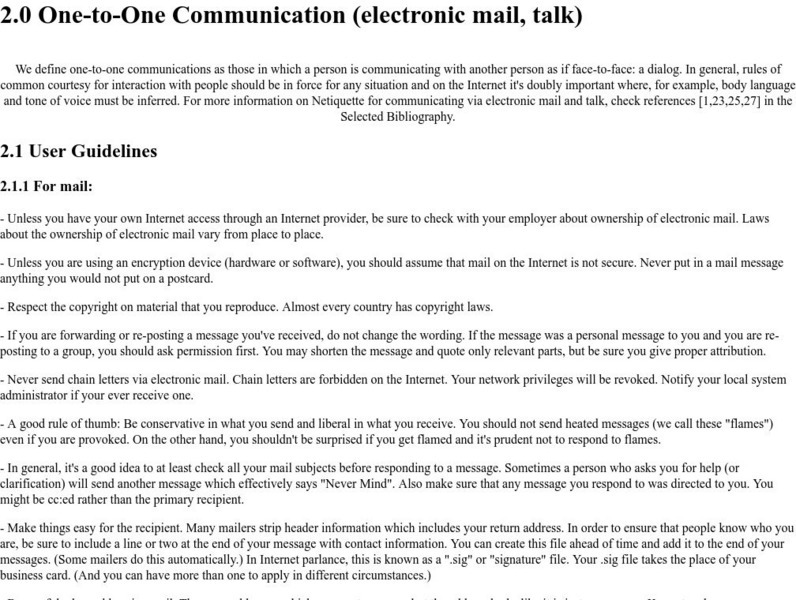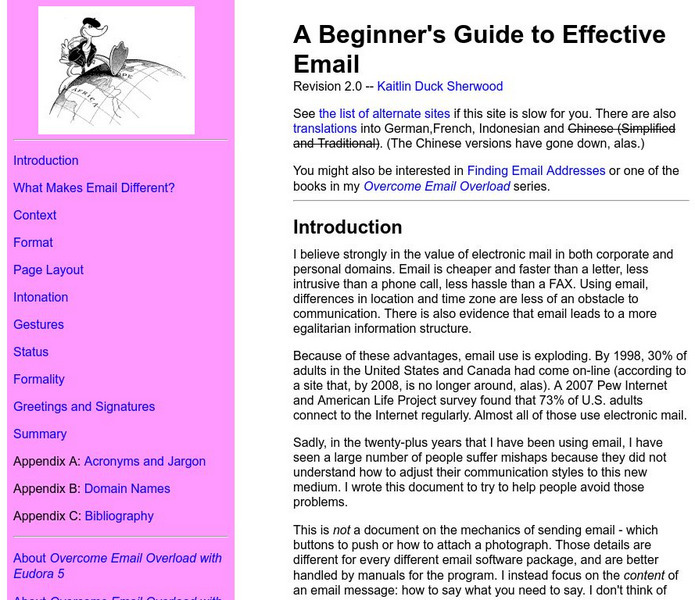Other
Digizen: Cyberbullying: Let's Fight It Together
Video tells the story of a young teenager who is subjected to cyberbullying-repeated hostile, harmful, and harassing attacks directed at individuals though technological means (Internet, mobile phones, social networking sites)....
Other
Wabash College: Introduction to Network Etiquette
This site from Wabash College gives rules not only for internet etiquette, but more specifically for etiquette concerning networks. This site is particularly relevant to college students.
Other
Personal Site: One to One Communication
This personal site provides users with essential information on developing personal communication skills through mail and talk.
Common Sense Media
Common Sense Media: Education: The Change You Want to See
Research shows that happiness in life is less about what you do and more about why you do it. When your actions have purpose, they lead to positive results -- both for you and the world. Help students use the power of the internet to...
Get Safe Online
Get Safe Online: Use a Firewall
Firewall software forms the first line of defense against hackers and certain types of computer viruses. This site explains what a firewall can do to help secure a computer and what it cannot do. The site also discusses different types...
Common Sense Media
Common Sense Media: Education: Lesson: Putting a Stop to Online Meanness
[Free Registration/Login Required] The internet is filled with all kinds of interesting people, but sometimes, some of them can be mean to each other. With this role play, help your students understand why it's often easier to be mean...
Code.org
Code.org: Cs Fundamentals: Course B
Learn the basics of computer science and internet safety. At the end of the course, create your very own game or story you can share.
Code.org
Code.org: Cs Fundamentals: Course A
Learn the basics of computer science and internet safety. At the end of the course, create your very own game or story you can share.
Common Sense Media
Common Sense Media: Education: Lesson Plan: Powerful Passwords
Students learn the benefits of using passwords and then play a board game to discover some strategies for creating and keeping secure passwords. Requires free membership.
Other
Childnet International: Digizen: Social Networking
Most students participate in social networking applications such as Facebook, MySpace, or Twitter. This site presents the benefits and risks of using social networking tools in education. The site also presents examples of successful...
Other
Wosu Public Media: Are You Digi Fit?: Choose to Be Positive With Others Online
This lesson teaches children how to behave appropriately when interacting with others online. They are guided in understanding how their words can be perceived by others online and how to deal with an online bully. Includes links to two...
Other
Cic Online: Cyberbullying: Identify and Respond [Pdf]
With this resource, learn how to know when cyberbullying is happening and how to confront the problem. PDF (requires Adobe Reader).
Common Sense Media
Common Sense Media: Education: Build Your Ideal Community: Grades 6 8
Middle schoolers will consider the characteristics of positive online communities that promote responsibility and respect. Requires free membership.
Common Sense Media
Common Sense Media: Education: My Creative Work (K 2)
Students learn the basics - title, name, and date - for crediting creative work. They discuss the importance of citing work, as well as recognizing that they should give themselves proper credit so that others can attribute their work...
BBC
Bbc Newsround: Tips for Good Passwords
This article presents common mistakes for creating insecure passwords and provides advice on creating strong passwords.
National Center for Missing & Exploited Children
Net Smartz Kids: The Boy Who Loved Im
Clicky tells the story of a boy who loves to IM his friends. What should he do when he receives a message from someone he doesn't know? [1:59]
Other
A Beginner's Guide to Effective Email
Informative site offering a comprehensive definition of e-mail and its uses. Also covers formatting, page layout, gestures, formalities, intonations, and greeting and signatures used in e-mailing.
University of Hawai'i
University of Hawaii: Network Etiquette
This site is provided for by the University of Hawaii. Information on network etiquette with information on not sending chain mail, spamming, and other Usenet inappropriate uses.










